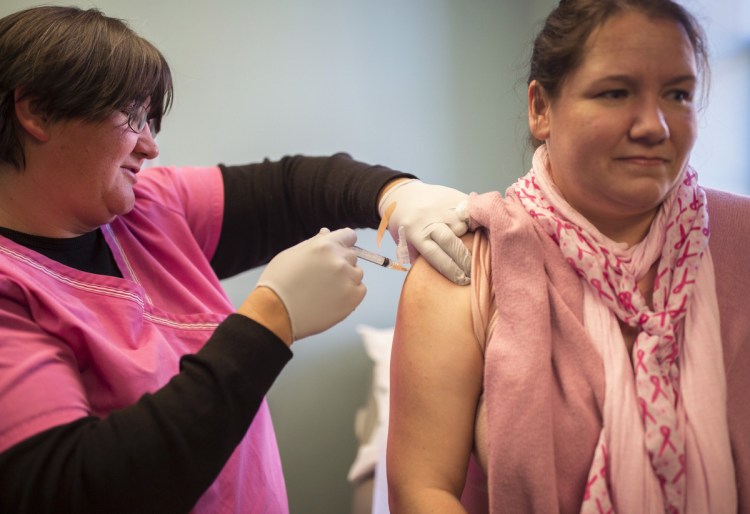The number of pertussis cases remained high in Maine for the fourth month in a row in January, with the rate of infection continuing to soar above the national average.
There were 55 cases of the highly contagious disease – commonly known as whooping cough – reported statewide last month compared to 24 in January 2018, according to the Maine Center for Disease Control and Prevention. Maine’s rates are the highest in the nation, and state health officials are puzzled about the reason.
“We don’t know exactly why rates in Maine continue to be stubbornly high compared to the national average or why they’re higher in specific counties, but we do know that pertussis is incredibly infectious, ” Emily Spencer, spokeswoman for the Maine CDC, said Sunday.
York County continued to see high rates, with 13 cases reported in January, higher than any other county in the state. In January, rates were also above the state average in Hancock County, with 16 cases – the highest number of any other county – and in Knox, Lincoln, Waldo and Washington counties.
The January increase followed similar increases in monthly reported cases since October, when the number ballooned to 64 cases from 43 in September, followed by 62 in November and 52 in December. There were 446 cases reported for the year in Maine in 2018 – up from 410 in 2017 – the highest since 2014, when 557 cases were reported.
The highest number of cases reported in the past decade was 737 in 2012.
Pertussis is a bacterial infection that produces a violent cough that can trigger vomiting and exhaustion. Babies too young to get vaccines and the elderly are especially vulnerable to serious cases, which may require hospitalization and can lead to death.
The cough can linger for up to 10 weeks. It is treated with antibiotics.
Although health experts don’t know exactly why rates in Maine are so high, they suspect the state has been vulnerable to pertussis infections for several reasons. Some parents are choosing not to have their children vaccinated. Also, the effectiveness of the vaccine wears off over time and requires a booster shot. The state didn’t adopt a booster requirement for middle schoolers until last year. Maine was one of the last states to adopt the booster requirement.
The hope is that the boosters will increase protection among middle schoolers, an age group with historically high rates of the disease, Spencer said.
Spencer said it is too soon to know if the required booster shots have helped.
“But we continue to track this information and plan on doing analysis as we gather more data,” she said.
Maine’s infection rate has consistently remained one of the highest in the country. In 2017 – the latest year for which data are available from the U.S. Centers for Disease Control and Prevention – Maine’s rate was 27.7 per 100,000 people, more than five times the national average of 4.9 per 100,000. Maine’s rate was the third highest in 2016.
Last year 34.3 percent of the cases reported in Maine were among 11- to 19-year-olds; 43 percent were among children 6 and younger, with 9 percent of those 11 months of younger; 12.6 percent among ages 7 to 10; and 10.1 percent among those 20 and older.
Immunizations are safe, decades of research have proved, and are not linked to autism. A 1998 study that claimed a link between vaccines and autism has been retracted and disproved. But the belief that they are linked has persisted.
Maine parents opt out of school-required vaccinations for their children entering kindergarten at higher rates than other states. Last year, opt-out rates increased to 5 percent of kindergartners for non-medical reasons, compared to 1.8 percent nationwide.
While almost all states grant religious exemptions from immunizations, 17 states, including Maine, allow exemptions on philosophical grounds because of personal, moral or other beliefs, according to the National Conference of State Legislatures. Maine is the only state in New England to allow philosophical exemptions, and New York state also allows them.
A bill to end non-medical exemptions from childhood vaccines is scheduled go before the Maine Legislature this year. If it is approved, Maine would become the fourth state – after California, Mississippi and West Virginia – to ban all non-medical exemptions.
The pertussis vaccine is not 100 percent effective. Typically it offers a good level of protection for the first two years after vaccination, and then decreases over time. Similarly, natural immunity after an infection may offer only a few years of protection.
“Nonetheless, Maine CDC continues to encourage folks to get vaccinated as appropriate,” Spencer said.
Meghan May, associate professor of microbiology and infectious diseases at the University of New England College of Osteopathic Medicine, has been studying why Maine’s pertussis rate is so high, even among people who have received the vaccine.
“Well more than half of the cases in Maine are in vaccinated children, fully vaccinated children, and that is not unique to Maine. It’s happening more and more all over the country,” she said.
Her research has found evidence that the pertussis organism manages to evolve in response to the vaccine, making the vaccine less effective.
But she said that is no reason not to get the vaccine, which offers protection, even if it loses some effectiveness.
Spencer said Maine continues to work with the federal CDC to follow the most up-to-date prevention and control recommendations.
The Maine CDC publishes monthly reports, like the one issued last week, to keep the public updated and to serve as a reminder that pertussis is widespread in Maine, she said.
Send questions/comments to the editors.




Edit your commenting username.